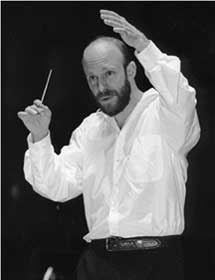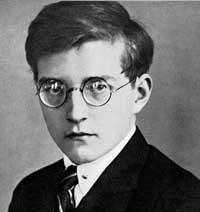Shostakovitch's Symphony No. 11: a Soul-searing Mirror of our Troubled Times by Jean-François Rivest and Lucie Renaud
/ March 2, 2003
Version française...
 Jean-François Rivest vows an unshakable love for Russian composer Dmitri
Shostakovitch. In the 2002-2003 season alone, he directed the Laval Symphony
Orchestra in Shostakovitch's Symphony No. 5, then made the arrangements
and directed the Ottawa Thirteen Strings in a revisited version of the Third
Quartet. On April 4, he will lead his students from the University of Montreal
orchestra in a performance of the Symphony No. 11. The maestro explains what
thrills him about the composer and presents his vision of the
masterpiece. Jean-François Rivest vows an unshakable love for Russian composer Dmitri
Shostakovitch. In the 2002-2003 season alone, he directed the Laval Symphony
Orchestra in Shostakovitch's Symphony No. 5, then made the arrangements
and directed the Ottawa Thirteen Strings in a revisited version of the Third
Quartet. On April 4, he will lead his students from the University of Montreal
orchestra in a performance of the Symphony No. 11. The maestro explains what
thrills him about the composer and presents his vision of the
masterpiece.
I regularly program
Shostakovitch's works because I believe that he is a major composer. I have
developed a personal liking for him. I think that I am really not a very serious
person in everyday life (Rivest is particularly fond of the caustic humour of
François Pérusse), but I love serious music. I believe that too often we tend to
analyze music with a magnifying glass and view it as an object of knowledge.
Shostakovitch, on the contrary, remains in direct contact with our
emotions.
Shostakovitch commands special
attention from the public. One music lover wrote that his works crave for a
public. Even though the composer strives to convey faithfully the image of one
nation, he depicts the woes of all nations, using the disasters and cataclysms
survived by the Russian people. In his music he guides us to an intimate
understanding of other people's day-to-day lives.
I strongly believe that music is
the best medium for empathy. I am convinced that we absolutely need empathy to
play music, empathy towards the public, the composer, and the musicians with
whom we play. This empathy allows the listener or the interpreter to feel the
emotions experienced by others, even without having lived through them
personally.
The Symphony No. 5, probably Shostakovitch's most famous work, remains
fundamentally classical: first movement in sonata form, slow movement, scherzo,
and finale. Underneath appearances, it was composed with an ultra-modern
language and in this it succeeds (I mention it to allow you to understand the
Eleventh). It creates a channel that
may be perceived by certain party members as glorifying the recent USSR and its
army (there are several military marches), but in which I believe the population
recognizes its hatred for military power, oppression, and humiliation. Music is
transformed into an outcry for survival, the raw side of life.
The multiple facets of Shostakovitch's work fascinate me as well the power
imbedded in his music, but I don't mean the surface-level power of cymbals and
trumpets. I would compare it to a hologram. Behind a very simple and repetitive
writing composed primarily of quarter and eighth notes, with mostly a classical
structure and sometimes simplistic themes (the Eleventh presents popular
songs of the Russian Revolution), it hides an incredibly structured mind which
holds all parts together as efficiently as a Beethoven symphony, albeit in a
more rocky, crystalline, earthly, sharp, metallic, and compact way.
From Beethoven's Eroica onwards, symphonies have been the mirror of an
entire world thought out by the composer, the zenith being achieved,
indisputably, in Bruckner's Fifth, Brahms's Second, or Mahler's
Ninth.
Shostakovitch doesn't fall into this category since communication is the driving
power behind his work. He always sets the social context in troubled times,
refusing to create a comfortable world for us; his prime goal is to tell us the
hardship of his nation. It is not the listener who travels, but Russia which
enters into us, aggressively. Thus we owe it to him, on the grounds of human
solidarity alone, to feel these emotions. 
Although Symphony No. 11 describes the violent events of January
9, 1905, it reflects deep down any uprising against oppression, at any moment in
history. Starving peasants march on the St. Petersburg winter palace. The first
movement portrays the underlying tension preceding this event: a slow orchestral
prelude, but enveloped in a cold ambiance, extreme tension, with the strings
straining at discordant chords, trumpets sounding as if preparing for battle,
timpani beating erratically. We hear songs of the Revolution from a far
distance, very softly and slowly. Almost slyly the second movement starts. Then
abruptly the crowd gathers, pushes, the guards push them away, and suddenly the
unbelievable occurs: Russians shoot Russians, brothers kill brothers, hundreds
lie on the snow in their blood, a vision from hell. The mass hysteria is
brilliantly depicted in one of the most horrifying musical narratives known to
me, a traumatic experience. The third movement is a gigantic funeral march,
rendered in a near-obscene way by its pizzicati, almost dodecaphonic, from which
emerges a sublime melody played by the viola. The last movement is ambiguous, as
if war were starting again, as if the dead were calling for revenge. Did
revolution win or did humans succeed in going beyond their pain? We will never
know, as Shostakovitch purposefully maintains his ambiguity.
Technically speaking, the symphony remains very difficult to play, and it is
my duty as a conductor to bring out the best in each musician. The music
requires close cooperation between musicians, so that they become one with the
subject and also have the desire to communicate these emotions. An intent
has to be conveyed; this work cannot be treated as an object of beauty to be
appreciated. Emotions must be communicated uncompromisingly. The Elventh is more powerful than [Shostakovitch's]
preceding musical works, it touches everybody, within the orchestra as well as
in the concert hall. The [UdeM] students loved it from the first reading. They
talked about it, and some violinists no longer in the orchestra even wanted to
rejoin it for this concert. This music shakes your inner soul, haunts you all
the way into your dreams.
The maestro's recommendations
Jean-François Rivest recommends three recordings of the Symphony No.
11. Two are historical readings, one by the Moscow Orchestra conducted by
Kyril Kondrashin and the other by the Leningrad Symphony Orchestra under Evgeny
Mravinsky. There is also a new version by the London Symphony Orchestra
conducted by Mstislav Rostropovitch which Rivest terms "astonishing".
[Translated by Caroline Labonne]
April 4, salle Claude-Champagne, Montreal, (514)
343-6427
Version française... |
|


